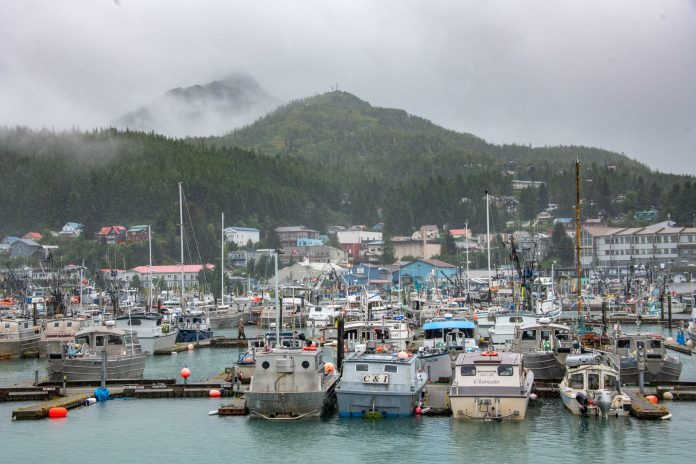A new analysis of the Alaska seafoods industry by a Seattle-based marine resources public relations firm points to the global downturn in seafood demand, the crash in salmon prices, and two upcoming cases before the nation’s highest court as the news to track in early 2024.
“If you’re not tracking the doldrums of the global seafood marketplace, you’re probably not in the business of catching, buying or selling fish,” is the blunt introduction into Ocean Strategies’ new annual fisheries policy report, released on Dec. 20
The report speaks to the bombshell news that apparently few, if any, in the seafood industry saw coming: Trident Seafoods’ decision to divest a portion of its Alaska processing infrastructure and to reduce its corporate workforce by 10%. Nobody saw it coming according to Kodiak Mayor Pat Branson, who spoke to The Cordova Times about the Trident news earlier last month.
The global downturn in seafood demand and crash of salmon prices this year notwithstanding, the sudden, significant decision by Trident to divert leaves many fishery-dependent communities in Alaska feeling even more uncertain after a difficult year, the report said. Consumers who haven’t benefited from price reductions in seafood at the retail markets and in restaurants may be surprised at the situation.
Despite all forecasts of domestic economic prosperity – including slowing inflation, robust federal employment numbers, and housing prices – domestic consumers are behaving more like we’re entering a recession than a period of prolonged economic prosperity, which is yet another likely contributing factor to decreasing demand for seafood, the report said.
Ocean Strategies, led by Brett Veerhusan, also advises readers of the report to keep a close eye on the first Supreme Court arguments on Jan. 17 for two cases pending on the Chevron doctrine. The doctrine gets its name from a 1984 ruling in the case of Chevron v. Natural Resources Defense Council (NRDC).
The cases to watch – Relentless v. Department of Commerce and Loper Bright Enterprises v. Raimondo – each aim to overturn a 40-year precedent directing federal courts to defer to any federal agency’s interpretation of an ambiguous statute, given the interpretation is deemed “reasonable.”
The crux of the litigation is that both cases claim that the National Marine Fisheries Service (NMFS) and the Commerce Department overstepped their authority by attempting to require commercial fishing vessels to pay for observers in the Atlantic herring fishery to ensure compliance with fishery regulations. The “ambiguous statute” in this case is the Magnuson-Stevens Fisheries Conservation and Management Act, which allows for fleet-financed observer coverage, but not explicitly for the Atlantic herring fishery.
Another reason to watch these cases, the report said, is they could lead to new precedence in deciding similar cases making their way through the court system.
The New England Fishermen’s Stewardship Association has filed a lawsuit contending that the regional fishery management councils are unconstitutional and anti-democratic. NOAA Fisheries contends that the councils are not federal agencies, and that their members are advisors rather than federal officers, serving as an advisory body to NOAA.
Ocean Strategies said their firm will also be tracking NOAA Fisheries’ next steps on the National Standard guidelines likely in the first quarter of the new year, and implementation of the Equity and Environmental Justice Strategy. Veerhusan, a lifelong Alaska commercial fisherman, policy expert and strategist, founded Ocean Strategies in 2017, with a focus on seafood, fisheries and marine resources. In 2022 Commerce Secretary Gina Raimondo appointed him to NOAA’s Marine Fisheries Advisory Committee.
The Ocean Strategies report also notes that climate-ready fisheries appear to be an emerging priority for NOAA Fisheries, focused on climate uncertainties regarding critical habitat, building resilient communities and incorporating a collaborative approach to problem solving. The effort is backed by Inflation Reduction Act funds totaling nearly $350 billion.
NOAA already has in place a Climate, Ecosystems, and Fisheries Initiative designed to build a modeling support system to inform managers and help decision makes respond to fisheries need, all while reducing impacts, increasing resilience and improving adaptation to changing ocean conditions. Ocean Strategies notes however, that an initiative is not a policy and that NOAA lacks an official definition for Climate Ready Fisheries specific to the agency and federal managers.
The report additionally looks at the value of seafood and harvesters in mainstream media. The report urges harvesters to consider a mainstream place as ambassadors for the entire seafood supply chain.
For example, Ocean Strategies consultant Hannah Heinbuch, a commercial harvester, recently spent time in a Seattle studio kitchen recording 26 back-to-back interviews focused on what makes seafood sustainable and how to enjoy it at home.
Meanwhile, despite the political gridlock in Congress this year, a suite of legislative proposals emerged at the end of the year focused on health, wellness, safety, and working waterfront preservation, all of which are key to sustainable fisheries.
NMFS released a National Equity and Environmental Justice Strategy, a new National Seafood Strategy, and an Arctic Report Card.
The agency has also taken first steps to update the National Standards guidelines, often referred to as the Fisheries Bill of Rights, with instructions to regional councils to use when creating and amending fishery management plans. More information about that should be forthcoming in the first quarter of 2024, the report said.















